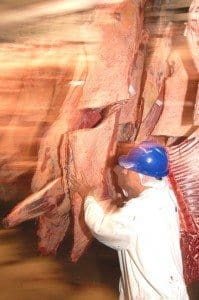CASUALTIES have started to emerge in the current very difficult meat processing environment, with confirmation this afternoon that the Manildra Meat Co beef, lamb and goatmeat plant at Cootamundra in New South Wales will close its doors.
 Squeezed by near-record high slaughter cattle prices, intense export market competition from a highly competitive Brazil and US, plus an A$ which has shot up US6c since the start of the year, red meat processors have racked-up big losses over the past year or more.
Squeezed by near-record high slaughter cattle prices, intense export market competition from a highly competitive Brazil and US, plus an A$ which has shot up US6c since the start of the year, red meat processors have racked-up big losses over the past year or more.
At the height of a recent slaughter cattle price rise three weeks ago (since eased a little), Queensland processors, for example, were reporting losses of upwards of $200 a head on heavy grassfed steer, and at least $140 a head on cows.
Losses of that size are unsustainable in the long-term, and ultimately, something had to give. Predictions of plant closures among smaller, independent operators with less exposure to vertical integration started last year, and have only gathered momentum in 2017. It’s likely more will follow.
Manildra will perform its last kill before mothballing the plant next Friday, 24 February.
Company general manager Jason Graham said in a statement that the decision was extremely difficult and that the group’s main concern was the welfare and future employment opportunities of its 150 permanent and 70 casual employees who would be affected by this decision.
“We cannot continue to maintain a viable business in the current industry environment, particularly given the record high livestock prices and the inability of our customers to absorb these price increases.”
“We cannot continue to maintain a viable business in the current industry environment, particularly given the record high livestock prices and the inability of our customers to absorb these price increases.
“All employees will be paid their full entitlements as defined in their employment agreements. We will be organising on-going on-site assistance for our employees in financial advice, job search skills, resume assistance and counselling services,” he said.
“Additionally, we would like to reassure our valued suppliers and producers that any outstanding financial obligations will be met.”
The company acknowledged that this decision would have a wider impact on the Cootamundra district.
A company spokesman indicated that processing operations would recommence ‘if and when’ the market circumstances allowed. No indication was provided about how long the closure might last, however a small maintenance team will continue to be based at the plant to maintain the assets.
As outlined in this earlier article, Manildra bought the former GM Scott Cootamundra abattoir in 2014, ending some 30 years of ownership by the Noble family. At time of purchase, the plant had capacity to process around 3500 lamb and 100 cattle per day, but Manildra said it planned to double the plant’s beef capacity.
Towards the end of last year, Manildra lost its Woolworths lamb supply contract to the nearby Junee meatworks, and reduced throughput on the beef chain earlier in 2016 as soaring cattle prices squeezed beef profit margins.
The company maintains sales offices throughout Asia and US for a range of branded beef and lamb products.
The Manildra Group operates a diversified agribusiness portfolio including four flour mills across NSW processing about one million tonnes of wheat each year, starch and ethanol production, canola oil processing and stockfeeds, in addition to its red meat processing operations.
Rumours circulated late last year that the company’s processing assets might be on the market, but the company strongly denied it in an article on Beef Central.
